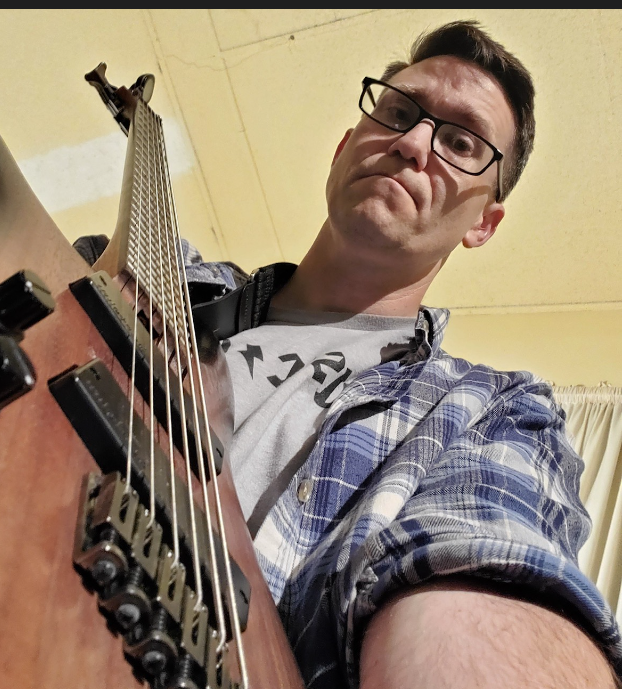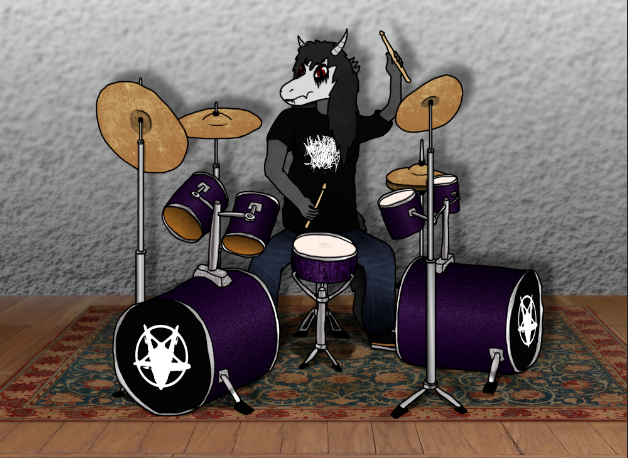After the recent release of the new album Salvation by Jessica & the Void Conspiracy I was able to catch Jessica for a chat about music, mental health and why sharing the messages in the album is so important.

Photo of Jessica holding a guitar. Photo credit Jessica B. Kelly
Oh man. Not sure what to say here, I mean I like short walks on the beach and Diet Coke, but I don’t think that’s what the question is getting at. Being serious, I’m an extremely mentally ill transgender musician. A product of trauma and chance, I am Bipolar Type 1 and also what is called in some circles as having a light form of Dissociative Identity Disorder (OSDD-1a) also known as Specified Dissociative Disorder type 1a. Basically all of this means that I’m riding the extreme highs and lows of bipolar, switching between suicidal depression, the most extreme mania, and everything in between, while having a self that bounces around between more than a handful of distinct personalities that mostly share a memory. Yeah, I’m trying to figure it out too.
The Bipolar 1 symptoms became especially severe two years ago and I was all but permanently manic for the time that followed. Those that follow me on Mastodon or know me in real life know that on a seemingly daily basis, I damn near bit the dust either intentionally or otherwise. If one believes in a cosmic force of probability, they should have bet on me being dead by this point, and that’s a very sobering thought. I know Venya in particular has thoughts on this subject, not knowing if the bass he was writing would see the light of day for an alive bandmate or as a requiem at a funeral. Thankfully the right meds were eventually found.
The OSDD-1a is much harder to navigate although less likely to kill me at any given moment. I haven’t felt like a woman or a “Jessica” or an anything since some severe pervasive trauma in the late naughts, and I could never explain why that was until very recently in trauma therapy. It turns out that I dissociate, a term that can be thought of as ‘extreme spacing out’ to avoid mental or physical pain, near constantly, resulting in a very foggy sense of self and an even worse memory. At one point the dissociation was so severe that I fragmented into parts, each with their own desires and aspects, although most tapping into a shared memory. It’s disorienting and that does not even begin to scratch the surface of the condition that I’m still learning about in the abstract and personally.
Music is a release. I can take all the nasties in my head and distill them into a violent sonic peace. I guess that I’m processing all the trauma in my life when I write music. That said, one part of me that consistently does not share memory is this creative part. I know that’s to protect me from the hell that I relive as I lay down music and lyrics. Hell, I wrote Salvation, and it still seems completely alien to me. I cannot deny the multi-faceted message of the album, but I also don’t feel that it’s completely real. I’ve listened to it thousands of times over the course of the writing and release cycle, and I still can’t internalize what I wrote.
However, that also leads to the answer to the question of ‘why share with so many?’ There are undoubtedly others struggling with the fascist forces of organized religion (the superficial message of Salvation) and there may be others trying to navigate their own DID / OSDD hell, and I want them to know that they are not alone. It does help that our groove metal magnum opus is as close to a masterpiece as we are capable of, but that’s not the point. There is a message here that has merit, and that message needs to be shared. To quote Venya, “Someone somewhere needs to hear our message, help us find those people.”
And that’s the payoff. Knowing that we’ve made a thing worth listening to. Knowing that we’ve made a thing that can help others understand, or at least endure. Let us take your pain and give you hope back in return.
This is a loaded question, haha. In many ways I’m a permanent amnesiac due to the psychological and psychiatric issues I work through. So to be completely honest, I had to go back and look through my notes as well as ask Lyra and Venya how we all originally met. Even then, I’m not sure I have the best picture on how we originally met other than Lyra offered her services for mixing some of my original solo work and Venya claims to have received strange messages from me asking for some bass work on a project that still hasn’t seen the light of day yet.
I digress. We are an international collective of sorts. Venya and I are American, and Lyra hails from Europe. As such, we work independently of each other, but always marching to whatever “vision” I have in the moment. I put vision in bunny quotes because we often find out that whatever I was writing and recording may not actually become clear in terms of message until later on as a result of my near-constant dissociation and other mental health concerns.

Photo of Venya holding a bass guitar. Photo credit Venya
I originally recorded three core writing cycles under my name only, Jessica Kelly, not to be confused with the pop musicians of the same name: Fidelity, Blood & Blackouts, and Voidtouched. The albums were always followed, as part of the musical cycle, by an electronic / industrial remix album, so people got to hear the original metal vision and then the remixes of that vision.
Lyra came on board to help mix and master the metal versions of those cycles. By the time Voidtouched rolled around, she was also providing the drums as well. Iteration of my skills and my vision, with her help, made up the theme of those releases, eventually I decided to bring a proper bassist on board in Venya.
We just wrapped and released our proper debut metal full-length as the band known as Jessica B. Kelly & The Void Conspiracy. Salvation was an improbable release. I flirted with death so many times over the past year and as I mentioned earlier, I’m not sure we actually knew thematically what Salvation was about until very close to release, after my bipolar and other mental health concerns were finally starting to be addressed. It turns out it’s not entirely about my disdain for organized religion, though that much is still true, but rather is a very personal reflection on how repeated trauma resulted in my now-realized and professionally-affirmed “mild” form of Dissociative Identity Disorder. The listener that takes a close look at the lyrics can see the album is allegorical and deals primarily with a sundered self.
The focus now shifts to the remixes, as has always been the case with my writing. Damnation will be released sometime early next year and we’re lining up all sorts of surprises for it.
With the unfortunate events at Bandcamp as of late, we have decided to diversify the way in which people can buy our music. There is still Bandcamp, as well as buying direct from us through our website. We also provide the album for free through Radio Free Fedi’s Faircamp site, and please check out Radio Free Fedi to listen to an Internet radio feed of many talented artists, not just us. We plan on having a small run of physical CDs of Salvation made as well, stay tuned.
For accessibilty for people who use a screen reader a full list of all the links can be found at the end of this article.

Drawing Lyra has created of a creature playing the drums
On Salvation, the core “horrors” and message of the album can be found in three songs that bleed into each other, which we’ve come to affectionately refer to as the Nitroglycerin trilogy. Start with Nitroglycerin, track six and let it run through the end of Divine Extortion, track eight, and I think you’ll understand the horrors of religious and other trauma have had on me. I believe they are the three best tracks musically on the album.